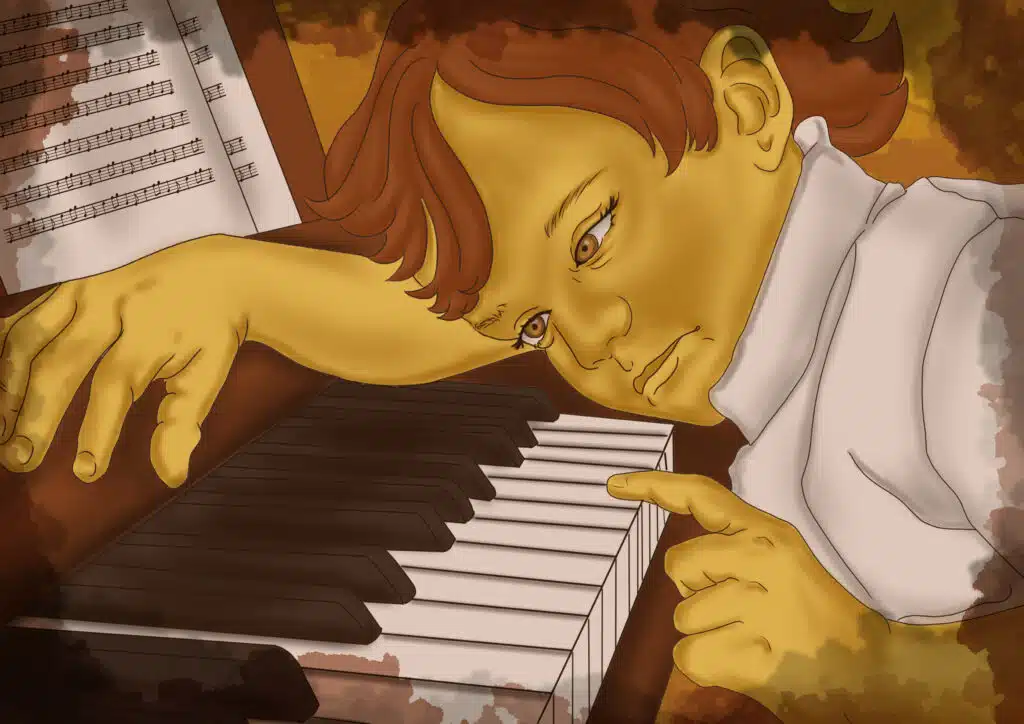By Robert Basler
Come and sit by my side if you love me,
do not hasten to bid me adieu,
but remember the Red River Valley,
and the cowboy who loved you so true
“Does she really love that cowboy?”
“Yes, I think she does.”
“Then why is she leaving him?”
“Sometimes people just think they have to do something like that.”
“They think they have to leave someone they love?”
“Sometimes.”
“Is she going to come back to him?”
“No.”
That wasn’t the answer I wanted. The song says she’s leaving and taking the sunshine that brightened his pathway awhile. That seemed unfathomable, and it suggested a brand-new aspect of life, one that I didn’t think I was going to like very much. Something called sadness.
I was maybe three and a half years old. We had no television, no streaming services, no record player… Let’s just cut to the chase and say that anything fun that people have today, we didn’t have back then. Something else we didn’t have, at least most of us, was sadness. I had my two parents and four grandparents, just the right number, so what was there to be sad about? Stories the grown-ups read to us were always happy. So were movies, except for “Bambi,” which I was pretty sure was just an error in judgment by someone who didn’t get the happiness memo.
It was just me and my parents, in our little house in Indianapolis. My mother was pregnant, and I was sure I would be getting a brother. I was wrong about that, as it turned out. When I say we didn’t have any kind of entertainment I forgot to mention The Songbook. My mother had a well-worn book of songs which families could sing together around the piano, although we didn’t have one of those, either.
Every afternoon, about 5 o’clock, we would sit on the bed, gaze out the window at the sundown shadows on East 44th Street, and sing from The Songbook for 30 minutes or so until we saw my father’s car come around the corner. But during that daily half-hour, as we sang together, I gradually realized that music was opening an unlocked side door and letting the sadness seep in. I got it. These songs were about big people problems. Things that disappointed them, things that went wrong in their lives, things that made them ache. To me, all sad songs seemed to have one of three elements at their core: someone dying, someone cheating or someone crossing a very wide river and just never coming back.
Ruby lips above the water
Blowing bubbles soft and fine
But alas, I was no swimmer
So I lost my Clementine
Oh, my darling, oh my darling
Oh my darling, Clementine
You are lost and gone forever
Dreadful sorrow, Clementine
Dreadful sorrow. The worst kind of sorrow, I guessed. Lost and gone forever? To a three-and-a-half-year-old, that seemed pretty permanent. But as strange as it may sound, I also took something positive away from “Clementine.” Long, long before I ever knew I would be working with words all my life, as a journalist, I instinctively loved the opening verse of that song:
In a cavern, in a canyon,
Excavating for a mine,
Was a miner, a forty-niner,
And his daughter, Clementine
Such a fun thing to sing! Rhythmic sounds, internal rhyming, a nod to history. Who knew language could do all this? But I should have stayed focused on poor Clementine, who was drowning because her true love hadn’t bothered to learn to swim. Generations of people would now know he never signed up for that free “Swimming for Forty-Niners” course down at the YMCA.
Near the top of my all-time seeping sadness greats was “On Top of Old Smokey,” where we learned, on a bleak, snow-covered mountaintop, that a false-hearted lover is “worse than a thief.”
He’ll hug you and kiss you,
And tell you more lies,
Than the ties of the railroad
Or the stars in the skies.
And consider this:
The other night, dear
As I lay sleeping
I dreamed I held you
In my arms
When I awoke, dear
I was mistaken
So I hung my head and I cried
“You are my Sunshine.” Pure sadness in a syrupy concentrate. Works both literally and metaphorically. Sadness doesn’t get any more convenient than that, and you’ll probably have some left over for tomorrow’s lunch.
When I was mentioning all the things we didn’t have back then, I should have said that at least we did have a radio. It was a Zenith, covered in a tweedy brown fabric. No clock, no alarm, no push-button preset stations, no FM, no Sirius. Just AM radio. It lived on a countertop in our kitchen. It was our only lifeline to the outside world, since our first telephone was still a couple of years off. It would be disingenuous of me to suggest that it was only The Songbook which allowed the sadness to seep in. The radio was even more to blame, delivering emotion by the dripping, sopping sponge full.
O, Shenandoah, I long to hear you,
Away you rolling river.
Across that wide and rolling river,
Ah-ha, I’m bound away, ‘Cross the wide Missouri
It would be several years before I would experience any kind of loss. I had a pet rabbit, named Snowball, who lived in a hutch in our back yard, until money for food got too tight and one day my father took him away to give him to a friend who had a circus, he said, where Snowball could perform all the tricks he had never actually learned. I didn’t want to go to the circus after that. I didn’t think “The Sad Circus of Discarded Inconvenient Pets” would be much of a day-brightener. I was small, but I wasn’t dimwitted.
But back to the songs, and back to the excitement of wonderful new words. If it was the 1950s, and you were a young child, and you wanted to boost your vocabulary, what you needed was a mother, a radio, and a dictionary. I have very vivid recollections of listening to the song, “Easter Parade,” one afternoon, on the Zenith Radio.
On the avenue, Fifth Avenue, the photographers will snap us,
And you’ll find that you’re in the rotogravure.
Oh, I could write a sonnet about your Easter bonnet,
And of the girl I’m taking to the Easter Parade
“What’s Fifth Avenue?” I asked my mother.
“That’s a street. I think it’s in New York City. They must have parades on it.”
“What’s a rotogravure?”
“That’s a tough one. Maybe it’s a kind of camera? Get the dictionary. Let’s look it up together.”
“What’s a sonnet?”
“I’m not sure. I think it’s some kind of a poem. Give me the dictionary, again. And don’t bother putting it back in the bookcase.”
“It said Shakespeare wrote sonnets. Who’s that?”
“Let’s just get out The Songbook. Daddy will be home, soon…”
When it came to studying sadness on the radio, especially the cheating kind, there was only one master lecturer, Professor Patsy Cline:
Broken song, empty words I know
Still live in my heart all alone
For that moonlit pass by the Alamo
And Rose, my Rose of San Antone
Or,
If you’ve got leavin’ on your mind
Tell me now, get it over
Hurt me now, get it over
If you’ve got leavin’ on your mind
Or,
Crazy, I’m crazy for feeling so lonely
I’m crazy, crazy for feeling so blue
I knew you’d love me as long as you wanted
And then someday you’d leave me for somebody new
Nobody sang more about sadness and loss than Patsy Cline, so when she ended up being taken from us suddenly in a plane crash, the irony was not lost on me. Tonight I’m having sweet dreams about you, Patsy.
And finally, there is this. When I was about two years old – too young to remember it – a man named Hiram Williams recorded a song that was such a stunning monument to heartsickness it wasn’t immediately evident how great it was. He wrote it to be spoken, not sung, until friends convinced him that it deserved its own tune. Even then, the song was released as the “B” side of a single, because Hiram Williams – oh, I’m sorry, I think you may know him better as Hank – didn’t know quite what he had. “I’m So Lonesome I Could Cry” was just so devastating that when you heard it, you sort of wished you hadn’t, but by then it was too late.
Hear that lonesome whippoorwill
He sounds too blue to fly
The midnight train is whining low
I’m so lonesome, I could cry
I’ve never seen a night so long
And time goes crawling by
The moon just went behind the clouds
To hide its face and cry
I was probably three or four years old when I first began to notice this song. Its emotional power came from searing imagery that anyone could relate to, and it blew that unguarded side door right off its hinges. It has since followed me around, nipping at my heels, for a solid lifetime. Don’t bother putting that door back up, boys. Naw, don’t change the lock, neither. All the sadness already done got inside, and I’m afraid it’s here to stay.
Over the years, I’ve often thought how clever the sadness is, furtively slipping in alongside us when we think we’re in the safest place in the world. All of us are just one lonesome whippoorwill, one frozen mountaintop, one wide river away from being in a Hank Williams song, and we should never forget that.
The silence of a falling star
Lights up a purple sky
And as I wonder where you are
I’m so lonesome, I could cry
Robert Basler was a life-long journalist, spending most of his career with Reuters, in New York City, Hong Kong and Washington, DC. He reported from Beijing, Beirut, and Ulan Bator, among other places. He went through the Khyber Pass twice and was annoyed to find there were no souvenir t-shirts for sale. He now lives in Indianapolis, about a mile and a half from where Vonnegut grew up, and thinks the Kurt Vonnegut Museum is easily the coolest place in town.

